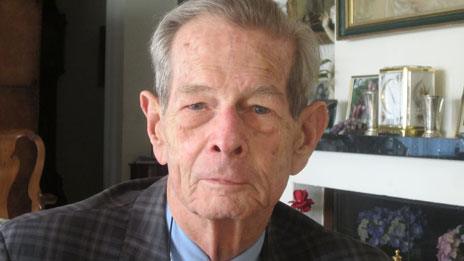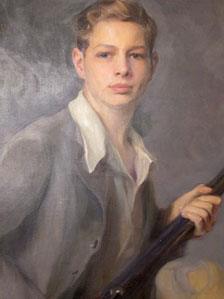Romania's ex-King Michael I defends his wartime record
- Published

The former King of Romania won a standing ovation as he addressed the country's parliament for the first time since 1947, to mark his 90th birthday. But the past few months have not been easy, with accusations flying that he betrayed Romania to the Soviet Union and allowed the deportation of the Jews.
Asked to react to recent criticism of him in his own country, King Michael of Romania laughs gruffly.
He is ninety years old and much admired in Romania, and the occasional barbs which come his way bounce off a skin hardened by both the battles of history, and the bitterness of exile.
I spoke to him at his home in Aubonne, a peaceful Swiss hamlet perched above Lake Geneva, just before he travelled to Bucharest for his birthday celebrations.
In a television chat show this summer, President Traian Basescu blamed the king for "betraying the national interest" by delivering Romania into the hands of the Soviets, when he was forced to abdicate in December 1947.
"It's not even worth reacting to a thing like that, because it's so small, you know. And that's the type. The small insults from him, the bigger he thinks he is. I couldn't care less!" the former monarch says.
President Basescu, the prime minister, and several ministers stayed away from the king's address to both houses of parliament in Bucharest on 25 October.
The aged king, his back as straight as a ramrod, sits forward in his chair to recall his abdication.
"It was the end of the year [30 December]. My secretary called up from Bucharest and said, Groza would like to see you as quick as possible... because they wanted to talk about a 'family problem'. We had just come back from Switzerland, and my future wife and I had just got engaged, so I thought they wanted to talk about that," he says.
Petru Groza was the communist prime minister, known as the "red bourgeois" because of his own, upper middle-class background.
"Well the family question was, to put it to me that I have to abdicate. That the times have changed, monarchies don't count any more, and all sorts of nonsense of that sort."
A glance out of the window confirmed that troops had taken up positions around the royal palace. Groza then threatened him, that if he did not sign the paper of abdication lying on the desk, then he would order the execution of about 1,000 pro-monarchy supporters, most of them students, who had been arrested at earlier rallies.
"What are you supposed to do in a situation like that?" he asks, rhetorically. To back up his threat, Groza even grabbed the king's hand, and forced him to touch a pistol in his jacket pocket.
Moment of glory
He bowed to the inevitable, and signed the paper. There was an impromptu meeting of parliament the same day, and the republic was proclaimed by a handful of deputies, in a session which only lasted 45 minutes. It was the end of a Romanian monarchy which had begun just 66 years earlier, after Romania's emergence as an independent country, and the defeat of the Ottoman Empire in the Russo-Turkish War.

King Michael was 18 at the outbreak of World War II
Another criticism of the king which occasionally surfaces, as it did in the Swiss newspaper Neue Zuercher Zeitung this summer, is that he did not do enough to stop the deportation of the Jews.
Again, the former king says there is no case to answer.
Marshal Ion Antonescu, Romania's wartime leader, excluded the young monarch (Michael was just 18 at the outbreak of World War II) from all key decisions. Antonescu's rule was marked by anti-Semitic atrocities, including racially discriminatory laws, deportations and pogroms.
The chief rabbi of Romania, Alexandru Shafran, kept the king and above all his mother Queen Helen informed about the next actions planned against the Jews. The queen then sought urgent meetings with Antonescu, and managed to have many anti-Jewish measures and orders rescinded. Her role in saving many thousand Jewish lives was later recognised by the Yad Vashem organisation in Israel.
"It was extraordinary, how much Antonescu respected my mother," King Michael recalls now. "Even though he didn't like what she was telling him, he listened to her."
The king's moment of glory came in August 1944, when he requested a meeting with Marshal Antonescu, and demanded his resignation.
"What - and leave the country in the hands of a child?" Antonescu retorted.
The king uttered a coded phrase, and three soldiers and a captain, listening in the next room, entered and arrested the furious marshal. A provisional government was formed, and an armistice announced - an end to hostilities with Soviet troops who were already pressing towards Romania's borders.
Within hours, German planes bombed the royal palace. Romania joined the Allied side, became a victor in the war, and the country was spared the devastation and loss of life of a Soviet military conquest.
Antonescu was executed by the Communist authorities after the war, and Romanian nationalists today still accuse the king of responsibility for the death of their hero.
'Bad habits'
King Michael is one of the few men alive who can claim to have had lunch with Hitler - once with his father in Bavaria in 1937, and with his mother in Berlin in 1941.
He cannot remember what they had to eat, but does remember Hitler praising the performance of Romanian troops on the eastern front - at that time, still fighting the Soviet army.
But what was Hitler actually like? He says he doesn't remember much of what was said - on one of the occasions, there was no translator to help him understand the German conversation.
"He would sometimes screw up his face..." says the king, grimacing for my benefit.
The festivities to honour his birthday in Bucharest include a royal gala performance at the opera, a dinner at the National Bank, and a presentation of awards.
In his first speech to parliament for 64 years, he offered a little criticism of his own.
"The time has come... to finally break with the bad habits of the past," Michael told a packed house.
There should be an end, he said, to "demagogy, selfishness and attempts to cling to power".
- Published25 October 2011